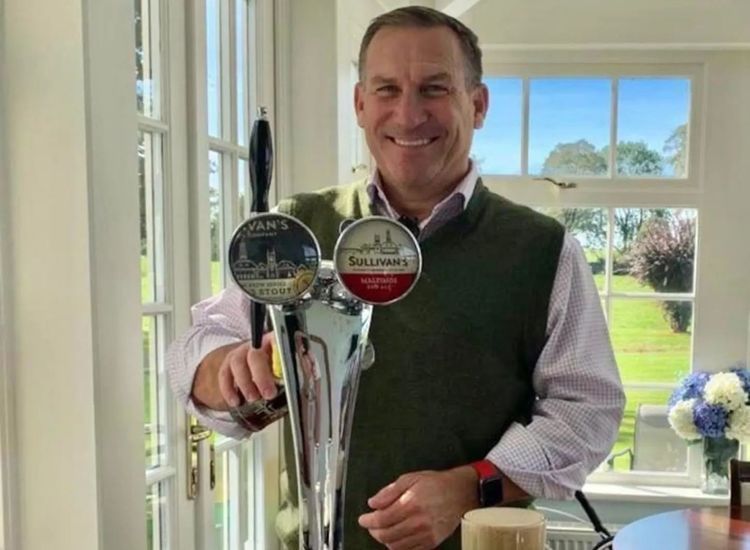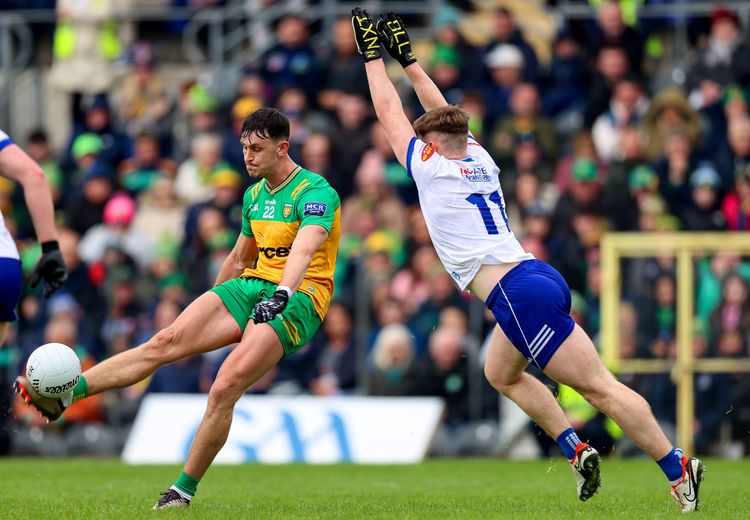The Rev. Joseph Mulligan S.J. in Nicaragua in 2010. PHOTO BY PETER MCDERMOTT
Between the Lines / By Peter McDermott
Paul Johnson’s move across the spectrum was hardly a dramatic one as political shifts go. But it was certainly noteworthy in that he’d been a longtime correspondent for the New Statesman, and its editor from 1965 through 1970.
After that, the former Bevanite – a devotee of Aneurin Bevan, the Cabinet minister closely identified with the setting up of the National Health Service in post-war Britain – became increasingly conservative and was ultimately an advisor to Prime Minister Margaret Thatcher.
Johnson was awarded the Presidential Medal of Freedom by George W. Bush in 2006, thanks largely to his authorship of doorstoppers like “Modern Times: A History of the World from the 1920s to the 1980s” (882 pages, in 1984) and “A History of the American People” (1088 pages, in 1997).
However, the writer educated by the Jesuits at Stonyhurst got far better reviews from all sides in the 1970s when he told the 2,000-year history of Christianity in less than 600 pages.
With all of that in mind, you would think that Johnson’s involvement with a documentary about the Society of Jesus might have produced something interesting. Instead, “Inigo and his Jesuits” (1991), as I recall from my borrowed copy from the New York Public Library, was pretty dreary.
A fellow conservative Catholic, the late Irish actor Cyril Cusack, assisted as an on-site narrator, appearing at crucial moments with, as they say at home in Dublin, a face like a plateful of mortal sins.
For his part, Johnson seemed to feel that the closer a Jesuit was in time to founder St. Ignatius Loyola, the more heroic he was likely to be. He cited an early Jesuit residence in Paris known for its privation as an example of how those guys could stick it out, not like the modern-day softies.
Johnson was sitting in a well-appointed upholstered chair as he relayed this opinion, with a nice fire going in the background (well, my faulty memory might have added the fire).
The Johnson/Cusack documentary was broadcast a decade after the Spanish Jesuit filmmaker Luís Espinal was kidnapped, tortured and killed by the Bolivian military, and just two years after the 1989 murders of six Jesuit priests, their housekeeper and her 16-year-old daughter at the hands of the El Salvadoran military.
Of course, for Johnson, these Jesuits of his own time (born in 1932, Espinal was four years his junior) were heretics, being adherents of Liberation Theology.
The other day I viewed an online show by Church Militant, a right-wing group out of Detroit, on which the Rev. James Martin S.J. was dubbed a “raging heretic,” no less.
Martin has been featured several times in the Irish Echo and, in an apparently unrelated development, was appointed by Pope Francis as a consultor to the Vatican's Secretariat for Communications.

The Rev. James Martin S.J.
PHOTO BY NUTOPIA
He is a popular priest with 500,000 followers on Facebook and books have brought in royalties that would make anyone else comfortably off financially. But the graduate of the Wharton School of Business took a vow of poverty 29 years ago when he left behind the corporate world and joined the Society of Jesus. He recalled in his first book, “In Good Company,” being occasionally surprised about how that vow could be interpreted in the United States. When a lavish meal was served at one residence, he remembered, an older member of the order and fellow visitor whispered to him: “If this is poverty, bring on chastity!”
Martin is in the news right now because he was recently disinvited from speaking at three events after an online campaign against him, orchestrated by what he has called a “kind of Catholic alt-right.” He was supposed to talk about Jesus at all three events, but it’s his latest book that is at issue.
“Building a Bridge: How the Catholic Church and the LGBT Community Can Enter into a Relationship of Respect, Compassion, and Sensitivity” was vetted by his Jesuit superiors, as well as endorsed by several American bishops and a leading Vatican official. Cardinal Joseph Tobin has called it “brave, prophetic and inspiring.”
“If you’re looking for a Catholic priest who inspires people—and makes them laugh and think—James Martin, SJ, is your guy,” said John Gehring in a Commonweal magazine piece about the controversy.
“Millennials are leaving the church in droves, turned off in part by an institution that has made opposition to same-sex marriage central to Catholic identity in the public square," he said.
“This generation of Catholics remains inspired by the church’s rich social justice tradition, has no patience for the culture wars, and is disgusted that their religious leaders are often perceived to be fighting against the human rights of gay people," added Gehring, who is Catholic program director of Faith in Public Life, and author of a book about Pope Francis's impact on the U.S. church. "When I heard the news last Friday that the seminary at Catholic University of America canceled a scheduled talk from Martin because a network of Catholic right attack dogs launched an ugly campaign against him, I cringed. The already-thin thread barely connecting these young Catholics to the institutional church just got thinner. Self-inflicted wounds are hard to heal.”
It was that social-justice tradition that led the Rev. John Corridan to take up the cause of brutally exploited longshoremen in post-war New York. The Jesuit’s example and leadership inspired his friend Budd Schulberg to write the screenplay for the classic film “On the Waterfront.”
In 1963, Detroit resident Joseph Mulligan, 20, seemed headed towards a career as a medical doctor. Instead, he joined the Jesuits. “To me it was interesting: the idea of freeing yourself and liberating yourself to considering something like that seriously and honestly,” Mulligan told me in an interview in 2010, “and feeling called.”
He added: “I was also blessed that my novice director was brand new to the job and he was just filled with the spirit of Vatican II.”
Later in the decade he protested the Vietnam War and was one of the Chicago 15, a group charged with destroying draft-board records. He was sentenced in 1970 to five years in prison and an additional five years’ probation.
Mulligan was paroled in 1972 and ordained a priest in 1973. He went to live with a poor community in Managua during the Contra-Sandinista war in Nicaragua and still lives there.
Michael O’Sullivan joined the Society of Jesus at age 17 in his native Limerick in 1969. Today he is a leading light in the Kansas-founded Society of the Study of Christian Spirituality, which holds world congresses. I interviewed him earlier this year about that work and the MA in Spirituality he leads at the Waterford Institute of Technology.
I’ve also talked to O’Sullivan on camera about his experiences in Chile from 1982 to 1984 and in Central America later on (the interview will be available to view online before Christmas, all going well).
O’Sullivan and some fellow Jesuits formed the Luís Espinal Community in a disadvantaged Dublin neighborhood shortly after the murder in Bolivia. Following his ordination he went to live in Arica in northern Chile. There was no native diocesan clergy there and people were ministered to by Jesuits from other parts of Chile and overseas as well as other religious including American Franciscan nuns.
O’Sullivan became a leader of the non-violent protest movement in the region and he increasingly became a target of the Pinochet military dictatorship. Two of his churches were damaged in fire-bombings and there was an apparent attempt to kill or at least seriously injure him. When it was clear that he could not be intimidated, the regime began to threaten violence against those close to him. At this point, the bishop and O’Sullivan’s Jesuit superiors, citing safety concerns, asked him to leave Chile.
[caption id="attachment_90534" align="alignnone" width="300"]
Pope Francis told the Jesuits last October: “The Church needs you, counts on you and continues to turn to you with confidence, particularly to reach the geographical and spiritual places where others do not reach, or find it difficult to reach.”
Just a few months earlier, 49 people were killed at Pulse, a predominantly gay nightclub in Orlando. Fr. Martin wrote this month in the Washington Post: “I found myself disappointed that more Catholic leaders did not offer support to the LGBT community. And that the few who did found it difficult to acknowledge that LGBT people specifically had been targeted for murder.”
Bishop Robert McElroy of San Diego said in a recent America magazine piece that Fr. Martin undertook a “particularly perilous project in this work of evangelization: building bridges between the church and the L.G.B.T. community in the United States.”
The bishop added: “‘Building a Bridge’ is a serious book, and any such work invites substantive criticism and dialogue.
“But alongside this legitimate and substantive criticism of Father Martin’s book, there has arisen both in Catholic journals and on social media a campaign to vilify Father Martin, to distort his work, to label him heterodox, to assassinate his personal character and to annihilate both the ideas and the dialogue that he has initiated.”
McElroy said: “The concerted attack on Father Martin’s work has been driven by three impulses: homophobia, a distortion of fundamental Catholic moral theology and a veiled attack on Pope Francis and his campaign against judgmentalism in the church.”
Martin said in his Washington Post piece: “Navigating through this backlash hasn’t been easy. But I am at peace with the book and with the mission to love and advocate for LGBT Catholics. After all, Francis asked the Jesuits to go to the ‘peripheries’ where people feel the Church isn’t serving them, or where they feel unloved. And I am trying to do what Jesus did, in reaching out to people on the margins and telling them that God created them, God loves them and God welcomes them. And that is the truth.”
These three Jesuits that I’ve interviewed over the years – Martin, Mulligan and O’Sullivan – have very different personalities but all impress with their gentleness of manner, and one would never for a second question their seriousness or commitment.

Paul Johnson, right, at the White House in 2006 when he was awarded
the Presidential Medal of Freedom. PHOTO: SHEALAH CRAIGHEAD
One wonders what Paul Johnson, slowing down as he approaches 90, would make of them.
A Daily Telegraph reporter in 2010 found that he’d mellowed somewhat.
She wrote: “[O]ne of the surprising things about Johnson, a man of reliably trenchant views, is that he is a late convert to uncertainty and has moments of insecurity.
“‘I am not by nature a very religious person.’ he says. ‘I could never have been a priest. But religion is something I hang on to very tenaciously, particularly as I get older. I couldn’t do without it. The world is such a horrible and terrifying place in many ways that to have a religious faith is your most precious possession. Militant atheists who go around trying to destroy the faith of young people do a great deal of harm.’”
The reporter said that sounded more like the Johnson of old.
In contrast to his view, though, if writers like Commonweal’s Gehring are any guide, it’s not so much the atheists as the fundamentalists and extremists, those who attack Fr. Martin for example, who are driving young people from Christianity and religious faith.








